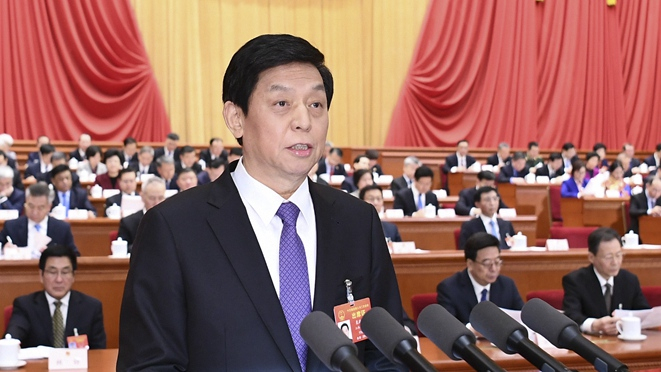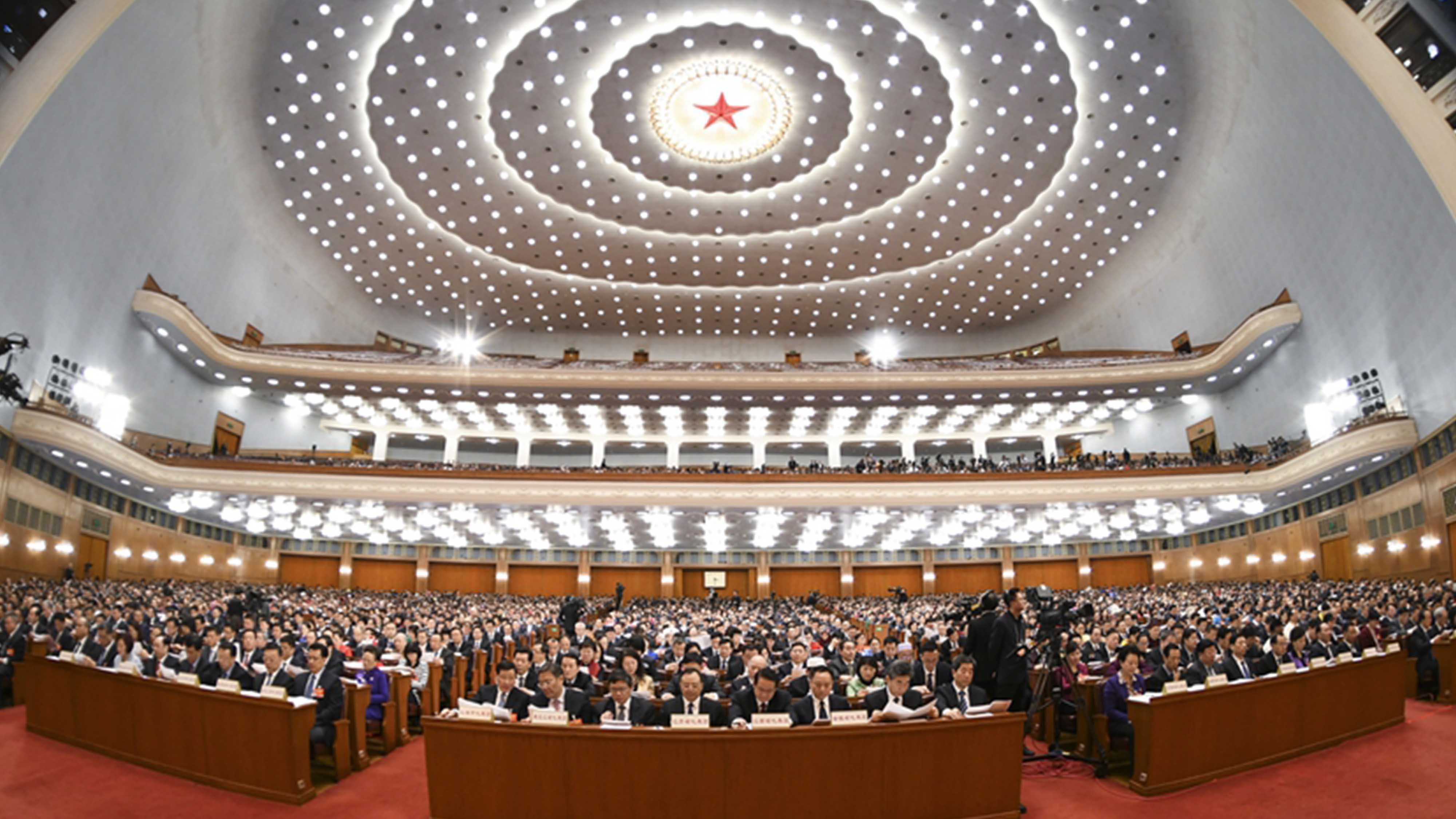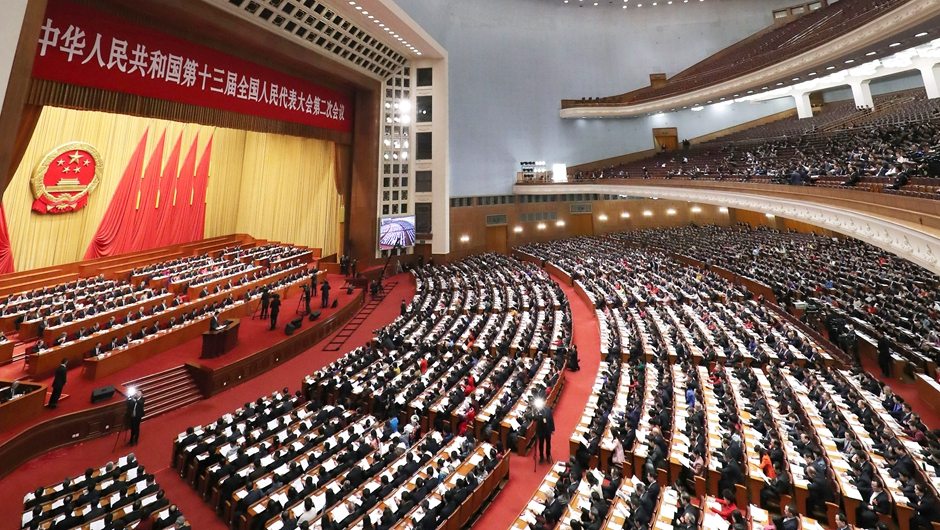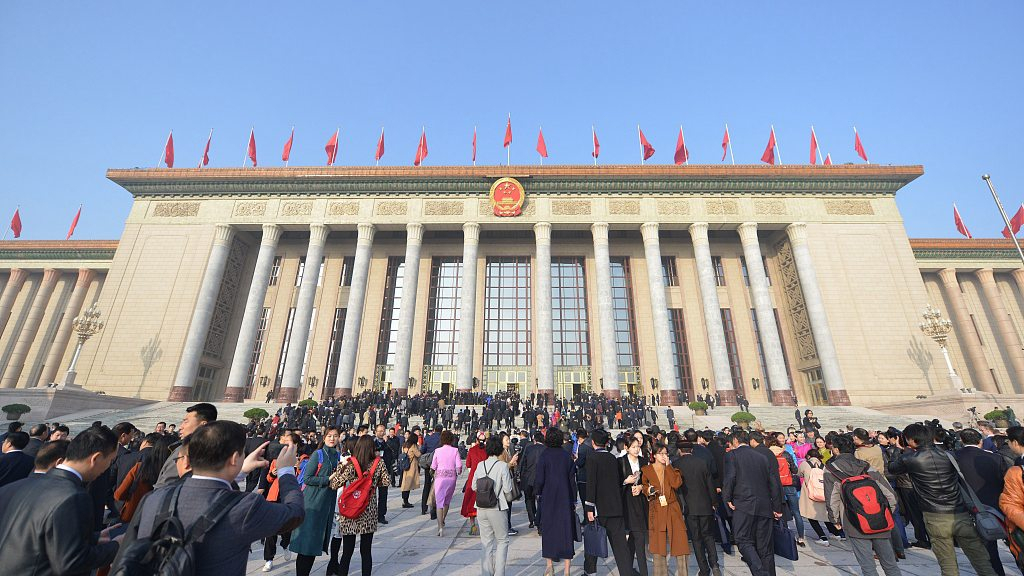
Domestic
21:09, 08-Mar-2019
China's top legislator stresses legislation support for high-quality development
CGTN

Li Zhanshu, chairman of the National People's Congress (NPC) Standing Committee, underscored efforts to provide China's high-quality development with the backing and support of high-quality legislation in 2019 in the committee's work report delivered to the second session of the 13th NPC on Friday.
In the work report, China's top legislator highlighted the country's key legislative work for 2019 and reviewed the committee's work in 2018.
Key tasks for 2019
China's key legislative work for 2019 includes deliberating on the Civil Code, formulating Amendment XI to the Criminal Law and the real estate tax law, and revising the Securities Law, among others, according to Li.
It is necessary to "move forward with formulating and revising urgently needed laws for deepening market-based reforms and expanding high-standard opening up," Li stressed.
The top legislature will expedite legislation in the domains of public wellbeing, national security, intellectual property rights protection, social governance, and ecological advancement, enforce the principle of law-based taxation, and improve relevant laws on state institutions, Li said.
01:02

The NPC will also strengthen oversight on laws on water pollution control, renewable energy, fisheries, promoting of small and medium-sized enterprises and employment, and higher education in 2019 as well.
It will conduct research focused on poverty alleviation, defusing financial risks, reform of the supervision system and implementation of the supervision law, according to the work report.
Foreign investment law
The draft foreign investment law, one of the spotlights of the ongoing annual session, has been submitted for its third reading.
The law "is a full reflection of new ideas, approaches, and measures in reform and opening up, and will play an important role in lifting China toward a new stage of high-level opening up in the new era," said Li.

The second session of the 13th NPC starts its second plenary meeting in Beijing on March 8, 2019. /Xinhua photo
The second session of the 13th NPC starts its second plenary meeting in Beijing on March 8, 2019. /Xinhua photo
Once adopted, it will become a new and fundamental law for China's foreign investment, said Wang Chen, vice chairman of the NPC Standing Committee, to deputies attending an NPC plenary session.
With unified provisions for the entry, promotion, protection, and management of foreign investment, the law" is a full testament to China's determination and confidence in opening wider to the outside world and promoting foreign investment in the new era," Wang stressed.
Review of 2018
Summing up its work over the past year, Li said the top legislature has got off to a good start under the leadership of the Central Committee of the Communist Party of China with Comrade Xi Jinping at its core.
Legislative efforts
The NPC Standing Committee formulated eight laws, revised 47 laws, and adopted nine decisions on legal issues and other major issues in 2018.
01:01

Apart from highlighting the amended Constitution and establishment of the national supervision system, the top legislator also underscored the committee's efforts to safeguard the people's rights and interests.
In response to people's concerns, the NPC Standing Committee sped up the compilation of the civil code towards its completion in 2020, revised Social Insurance law and Personal Income Tax Law that exempted 80 million people from paying taxes on salary, and expedited legislation on vaccine management in the wake of the Changsheng vaccine case.
To build ecological civilization, the top legislature formulated the Law on the Prevention and Control of Soil Pollution in 2018 and revised other laws on pollution prevention.
It also fulfilled its oversight duties in accordance with the law to better promote economic and social development and aid the advancement of reform tasks, Li said.
01:13

International exchanges
Over the past year, the NPC sent 71 delegations with a total of 660 people on visits to 46 countries, and received 58 delegations with a total of 730 people from 34 countries and two multilateral parliamentary organizations.
The exchange and cooperation with legislative bodies "effectively serve national strategies and safeguard national interests," Li said.
Apart from keeping contact with national parliamentary bodies of Russia, the U.S., France, Japan and the European Parliament, the top legislature also strengthened exchanges with legislative bodies of neighboring countries and African countries, and countries along the Belt and Road.

SITEMAP
Copyright © 2018 CGTN. Beijing ICP prepared NO.16065310-3
Copyright © 2018 CGTN. Beijing ICP prepared NO.16065310-3